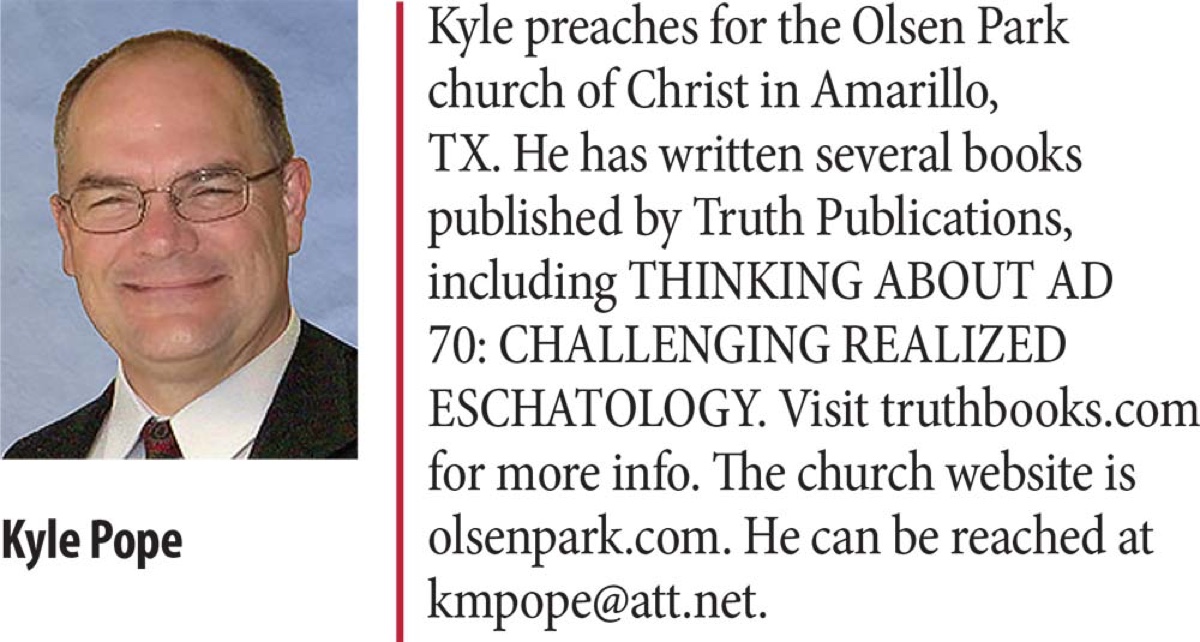
by Kyle Pope
Synopsis; How should Christians handle circumstances in which a brother or sister in Christ promotes doctrinal error? What biblical principles should guide and govern our behavior?
Few conditions are as challenging to our relationship with fellow-Christians than those times when we must confront brethren who have embraced error. In most cases, they do not see their choices as unsound. In fact, they may well imagine that they have reached an understanding of an issue that is deeper, fuller, or truer to the teachings of Scripture than they previously held. How must we approach such situations? What guidance from God’s word can we follow through these difficult times? In this study, we will consider five principles that should direct our words and actions in dealing with brethren in doctrinal error.
The easiest course when facing a task that is difficult or undesirable is to do nothing. That’s why we put off cleaning the garage, repairing that broken fence, or organizing our storage shed. We know the work will be hard and the choices difficult, so we choose not to act until circumstances demand it. In spiritual matters, this can be devastating. On two occasions, the apostle Paul cited the practical warning, “a little leaven leavens the whole lump.” The first is in a question to the Corinthians urging them to recognize the danger posed to the congregation by allowing sexual immorality to go undisciplined (1 Cor. 5:6). The second is in the closing chapters of his letter to the churches of Galatia who were wrestling with the false teachings of the Judaizing teachers (Gal. 5:9). In both cases, just as a small amount of yeast can work through an entire batch of dough, so unaddressed sin and error can quickly influence others to accept and practice the same things. Certainly, “the prudent considers well his steps” (Prov. 14:15b), but we must never confuse patience and thoughtfulness with neglect and inactivity. A failure to confront a brother in error may quickly lead to a much bigger problem that is even harder to resolve.
I am the youngest of three brothers. As a child, it was not uncommon for my older brothers to be left in charge if my parents had to be away from the house for an hour or so. During that time, I had to do what they said, but they had to answer to mom and dad for what they said and how they said it! In 2 Thessalonians 3:6-15, Paul instructed the church to discipline some who were taking advantage of the generosity of others while refusing to work. They were to “withdraw from every brother who walks disorderly and not according to the tradition which he received from us” (3:6). Paul ended his instruction with this caution, “Yet do not count him as an enemy, but admonish him as a brother” (3:15). Our brothers and sisters who have wandered into sin and error do not stop being our brethren. Although they are erring brethren, they remain children of God in need of restoration to a faithful relationship with Him. While the nature of our association with them must change, we both remain accountable to the same Father in heaven. Jesus taught, “for every idle word men may speak, they will give account of it in the day of judgment” (Matt. 12:36). As we confront their error, let us remember that we will answer to God for what we have said and how we have said it to them. The word translated “admonish” in 2 Thessalonians 3:15 literally means to call to mind . In the emotion and stress of admonition, we aren’t shouting down an enemy but reminding fellow-children of our heavenly Father what He has called us to be.
In a laboratory setting, great caution must be used in dealing with hazardous chemicals. The wrong combinations can become toxic or explosive. Rigid safeguards and protocols are followed to protect lab workers against these dangers. Only a few verses after Paul’s warning to the Galatian churches about leaven (Gal. 5:9), he wrote, “Brethren, if a man is overtaken in any trespass, you who are spiritual restore such a one in a spirit of gentleness, considering yourself lest you also be tempted” (Gal. 6:1). Confronting error is a dangerous thing! What if I am influenced to accept and believe error? Am I grounded enough to distinguish truth from error? What if I sin in the way I speak to or treat a brother I am trying to draw away from sin? Like the lab worker, it is important to go into these situations fully aware of the many dangers that could arise. In correcting the Galatians, Paul asked, “Have I therefore become your enemy because I tell you the truth?” (Gal. 4:16). A very real danger in confronting error is that it can change former friends and co-workers into enemies. True love and friendship, “does not rejoice in iniquity, but rejoices in the truth” (1 Cor. 13:6). If a brother does not recognize that, alienation may be unavoidable, but we must take every precaution to avoid personal sin in our efforts to address the situation.
In Romans 14:1-23, Paul instructed the Christians in Rome on how to deal with issues of conscience that arose when new converts from Judaism still felt compelled to follow the Mosaic religious calendar and dietary restrictions. While those requirements were no longer binding under Christ, he taught them that acting in doubt was sinful (14:23). That created a challenging situation. How should those who were fully convinced of their liberty in Christ respond to those who had doubts? Paul commanded, “let us not judge one another anymore, but rather resolve this, not to put a stumbling block or a cause to fall in our brother’s way” (14:13). This principle has application to our topic. As we confront sin and error, we must never put a “stumbling block” in our brother’s way. We might do this by humiliating him. Discipline is intended to make one feel ashamed (2 Thess. 3:14), but Paul warned that one can be “be swallowed up with too much sorrow” (2 Cor. 2:7). We must leave open to those we confront an honorable way to forsake their error. Pride can lead souls to remain stubbornly in conditions they recognize to be wrong rather than yielding to those they feel have mistreated them. Charges of mistreatment are often unfounded, but we must never act in ways that actually make it harder for brethren to come back to faithfulness to the Lord. If it would not restore us if it were done to us, we shouldn’t do it to someone else (Matt. 7:12).
While these cautions are important, John warns of another danger we must not overlook. Through the Holy Spirit, he wrote, “Whoever transgresses and does not abide in the doctrine of Christ does not have God. He who abides in the doctrine of Christ has both the Father and the Son” (2 John 9). The “doctrine of Christ” represents sound teaching about Christ but also His general teachings while on earth and through His apostles. It is the gospel. John warns that turning away from the truth of the gospel ultimately sacrifices one’s relationship to God. This is serious business. Souls are at stake! John further writes, “If anyone comes to you and does not bring this doctrine, do not receive him into your house nor greet him; for he who greets him shares in his evil deeds” (2 John 10-11). The word translated “greet” means to rejoice , be well , or be glad . This is not the same word Jesus used to urge His disciples to “greet” or “salute” (KJV, ASV) those beyond simply our friends and brethren (Matt. 5:44-47). John is talking about wishing erring brethren happiness and joy in their error! No, we must not treat them with rudeness, as if they were our enemies (2 Thess. 3:15), but neither can we act as if everything is fine. If it is not clear to the brother we confront (and to those who observe our interaction with him) that we consider him to be in sin and error, John says we share “in his evil deeds.” Just as inactivity can allow a dangerous influence to spread, a treatment of those in error that is too accepting can actually stain us with the guilt of their error. May God help us avoid such dangers and lovingly bring souls back to faithfulness to Him while guarding against the destructive consequences which sin and error pose to God’s people. 


